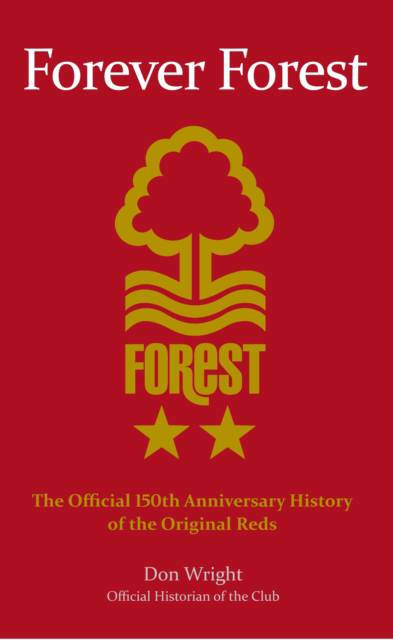
- Retrait gratuit dans votre magasin Club
- 7.000.000 titres dans notre catalogue
- Payer en toute sécurité
- Toujours un magasin près de chez vous
- Retrait gratuit dans votre magasin Club
- 7.000.0000 titres dans notre catalogue
- Payer en toute sécurité
- Toujours un magasin près de chez vous
Forever Forest
The Official 150th Anniversary History of the Original Reds
Don Wright
Livre relié | Anglais
27,95 €
+ 55 points
Description
Nottingham was crowned England's first City of Football, the Major Oak in Sherwood Forest was chosen as the country's best-loved tree and both Nottingham Forest Football Club and the city's Theatre Royal celebrated their 150th anniversaries, all in 2015. Forest is the second oldest football league club in the world (after Notts County, which began in 1862) and Don Wright tells its unique story largely through the exceptional individuals who formed and shaped it. Inspired by Italian freedom fighter Giuseppe Garibaldi's redshirts, the young founders of the Forest Football Club, who played on the Forest recreation ground near the centre of Nottingham, decided that Garibaldi red would be their colour and so it has remained ever since. Forest are the original reds of world soccer. Walter Roe Lymbery was in turn captain, chairman and secretary/treasurer, setting the club on its feet. Another Victorian, Sam Weller Widdowson contributed new methods and ideas. He invented the shinguard, proposed the referee's whistle and introduced the 2-3-5 line-up that was universally adopted and still in use up to the 1950s. Tinsley Lindley was a famous Forester and Corinthian who championed the cause of the professional player. Forest won the FA Cup for the first time in 1898 and celebrated by opening the City Ground. Frank and Fred Forman became the first brothers from the same Football League club to be capped by England. Less well known were winger Bob Firth and centre-forward Randolph Septimus Galloway both of whom made their mark in Europe as managers. Firth made Real Madrid champions of Spain in 1932/32 and Galloway guided Sporting Lisbon to three Portuguese titles from 1950 to 1953. Back home, Bob Marsters' Forest defeated Everton to win the Victory Shield in 1919. But the master managers were Billy Walker, twenty-one years in office, and Brian Clough, eighteen years in charge. Walker gave the Reds a glorious decade when they climbed from the Third Division South to the top flight and won the FA Cup in 1959. Clough, with Peter Taylor's help, made Forest English champions and twice champions of Europe. Truly, the Forest story is the stuff of legends.
Spécifications
Parties prenantes
- Auteur(s) :
- Editeur:
Contenu
- Nombre de pages :
- 256
- Langue:
- Anglais
Caractéristiques
- EAN:
- 9781445634968
- Date de parution :
- 15-08-15
- Format:
- Livre relié
- Format numérique:
- Genaaid
- Dimensions :
- 156 mm x 234 mm
- Poids :
- 540 g

Les avis
Nous publions uniquement les avis qui respectent les conditions requises. Consultez nos conditions pour les avis.






